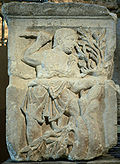This article needs additional citations for verification .(November 2025) |
Bormana was a Celtic goddess, the female equivalent of the god Borvo (Bormanus). Bormana was worshipped alongside Bormanus as his consort. [1] [2]
The pair of them were, for example, worshipped at Die (Drôme) in the south of France. The goddess also occurred independently at Saint-Vulbas (Ain). Bormana was considered a goddess of water and healing. Bormana was named after the Celtic word for “to Boil”, she was associated with the 2 Hot spring baths called; Bourbon-Lancy and Bourbonne-les-Bains both named after her and her consort.

